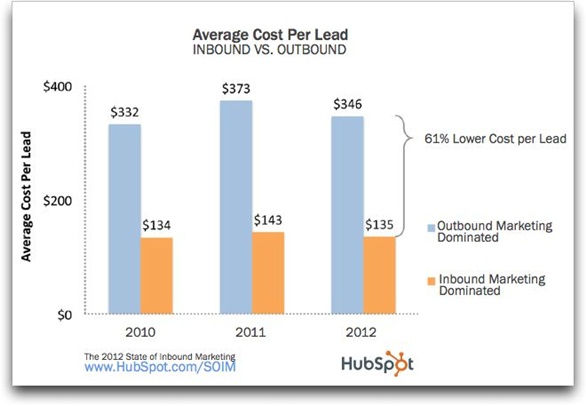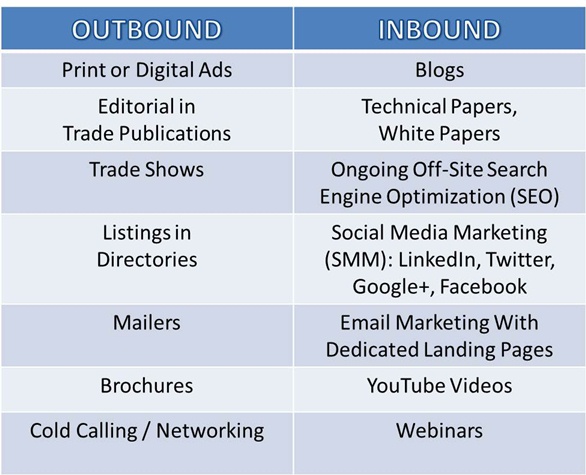Frequently Asked Questions About Inbound Marketing
Even though there is a wealth of information available in books and online about Inbound Marketing, there still exists great uncertainty and downright confusion as to what it really means, especially in the industrial world. Perhaps the wealth of information contributes to the problem. There is SO much information that someone with limited time to spend learning about a new way of marketing can become overwhelmed.
How is Inbound Marketing different from the marketing we’re doing now? What does “Inbound Marketing” consist of? Does it cost less than traditional marketing? Do we have to do everything to get results? Where do we start? Can’t we do some of these things ourselves (in other words, is it really necessary to hire a digital marketing firm?) There are so many differing opinions, it’s easy to understand how someone could easily become frustrated and push the whole idea of Inbound Marketing to the back burner. These questions are some of the most frequently asked of Marketects, and this is how we respond.
How is Inbound Marketing different from the marketing we’re doing now?
Simply put, Inbound Marketing consists of integrated tactics that help customers FIND YOU based on how and where they are searching for products and services on the Internet: it is a system of marketing by attraction. Traditional marketing (what you’re doing now) has been called “interruption” marketing. All of the traditional industrial marketing tactics that have been used since there WAS marketing are basically thrown out into the marketplace, and you, as the marketer, hope to generate enough interest (by interruption) to get a potential customer to contact you.
The chart below illustrates the difference in tactics.
What does industrial Inbound Marketing consist of?
There are 6 basic key elements to a successful Inbound Marketing program:
[framed_box]
1. Website
3. Content plan (blogging, videos, pictures, articles, etc.)
4. SEO (search engine optimization) – on-site and off-site, or link building
5. SMM (social media marketing)
6. Metrics analysis and course correction
[/framed_box]
In addition to the essential components listed above, there are several optional tactics that can be added to turbocharge an Inbound program:
1. PPC (pay-per-click) advertising
2. Banner advertising on industry related websites
3. Email marketing
Does it cost less than traditional marketing?
That depends on two things. First, if you already have an annual marketing budget that is used for print ads, trade shows, direct mail, and other traditional marketing tactics, then relatively speaking you should find an Inbound Marketing program to be much more cost effective. Most firms that offer comprehensive Inbound Marketing services charge a monthly retainer, since the work can sometimes be daily, is ongoing, and there are usually several team members involved with an account. Having said that, there are large (expensive) digital marketing agencies, just as there are large (expensive) ad or traditional agencies. Look for a company that has specialists in each important area of an inbound program, but will work with you on budget.
Do we have to do all of these things to get results?
The correct answer is: YES. If you decide to eliminate any of the key components, it will take much longer to get results, and it will be much harder to gauge results. We strongly discourage clients from considering the list a menu, but rather view it as a necessary, integrated whole that will produce results within a relatively short period of time. “Relatively short” is dependent on your business and how competitive your chosen keywords are. It is not unusual for industrial companies with specialized products or services to see significant results in less than 6 months if they outsource their program to professionals who use sound Inbound Marketing practices.
Where do we start?
Assuming you already have an SEO compliant website, the first thing to do is develop your keyword strategy. This is not quite as easy as it sounds. Often, the keywords you “think” your potential customers will use to search for your products or services are not at all what they use. Or maybe they do use those keywords, but there are others you haven’t even thought about. For instance, instead of searching for the “solution” to a problem (your product or service) they search based on the problem itself. Example: instead of searching for “high temperature wear rings” they search for “high temperature pump failure.” An SEO specialist can analyze search data and help you come up with the right list of keywords. Over time, that list will probably change as performance and metrics are analyzed.
As soon as you have your keyword list, you need to start auditing your available content. What is already available to you to use for blog posts, social media posts, etc.? The most obvious place to start is with your sales materials: brochures, case histories, presentations, videos, even pictures. If you have engineers that write technical articles or papers, these should also be included. One technical paper can sometimes be broken down to 3, 5, even 10 blog posts! What content will need to be developed to fill the gap between what you already have, and what you’ll need to work in your chosen keywords?
Can’t we do some of these things ourselves?
The answer is: YES; but be honest with yourself. Will it really get done? Many people think social media marketing could easily be managed by someone internally. After all, it’s just playing around on the Internet – right? Wrong. There should be a social media strategy in place that is tied to the content plan; and it is definitely not play. It takes forethought and most of all, time. Another area companies think they can manage themselves is their Blog. We manage blogs for multiple clients and know firsthand how difficult it is to even get written pieces edited and approved; much less written. It is much easier to let people slack off or miss deadlines as an internal project manager who isn’t accountable for the entire program’s results.
If you don’t hire an employee who is dedicated to Inbound Marketing, whatever portion of the program you decide to manage internally will be delegated to someone who already has a full plate of responsibilities. In our experience working with manufacturing and industrial service companies, even if “marketing” is in a person’s job title they rarely focus on marketing communications alone. There is almost always business development, sales, or even a role completely unrelated to sales and marketing that is part of their job description. Throw travel into the mix and timely execution becomes even more dicey. This may all sound like negative thinking; but it’s just human nature.
I have more questions!
It is Marketects’ mission to help industrial companies understand what Inbound Marketing is; how and why it works; and then provide the support they need to execute an Inbound Marketing plan that drives results. That is why we are sponsoring a free, half-day seminar on Industrial Inbound Marketing, in Houston on 1/31/13.
You’ll have the opportunity to get ALL of your questions about Inbound Marketing answered if you attend the IMRevo Industrial Inbound Marketing Seminar in Houston, 1/31/13. During this free half day seminar you will hear from Inbound and Industrial Marketing specialists who will demystify Inbound Marketing. You’ll see all of the components deconstructed, hear about practical application, and leave with the confidence you need to either get buy-in from others in your company for Inbound Marketing or make an educated decision when selecting a firm to support you. Space is limited, so REGISTER NOW!



[…] https://marketectsinc.com/most-frequently-asked-questions-about-inbound-marketing/ […]